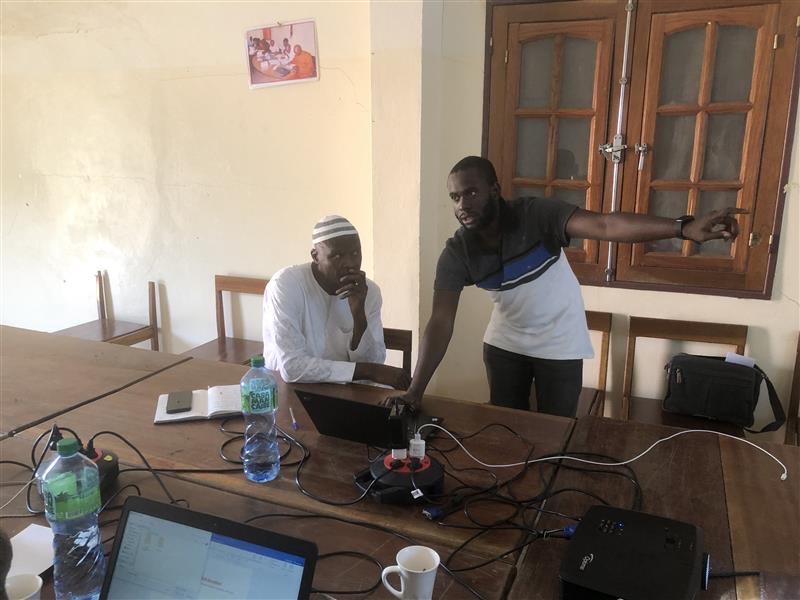As a reminder, in the first part (see article), we talked about the CGER's digital transformation diagnosis and strategy. In particular, we discussed the methodology and the diagnostic process:
Understanding the existing organisation and situation
Meet the worker bees, customers and partners
Focus on digital and the need to avoid jumping to conclusions
Validation of preliminary results
Solution selection process
In this article, we will focus on the implementation of the strategy and the importance of the role of the focal point within the CGER in the process of digitalising the organisation.
Drawing up and presenting the action plan
After the diagnosis and the choice of solution, we drew up a detailed plan which we presented and validated with the CGER and the GIZ in order to be able to align with the stages of project implementation.
The most important point was to convince them of the need to have a focal point within the CGER who could take the digital transformation beyond the end of our support. It was with this in mind that we co-developed a job description for the Information System Manager (ISM) to be recruited by the CGER.
RSI recruitment
We have published the job description and shared it with our networks. Here is a summary of the profiles received:
26 applications received (0% from women)
62% of applicants live in Dakar and 12% in Saint-Louis. The majority of applicants are prepared to work permanently in Saint-Louis.
58% of applicants have completed 5 years of higher education, 15% have completed 4 years of higher education and 27% have completed 3 years of higher education
35% of applicants have more than 5 years' experience, 23% have 5 years' experience, 12% have 3 years' experience, 12% have 2 years' experience, 15% have 1 year's experience and 4% have no experience,
With the participation of the CGER, we interviewed the 5 best profiles to see if their technical skills (HARD SKILLS) and interpersonal skills (SOFT SKILLS) corresponded to the CGER's needs regarding the RSI's mission:
Technical skills assessed: setting up a support system, setting up and managing a Microsoft 365 system, collecting and analysing data, drafting specifications.
Interpersonal skills: working with users of different skill levels, training experience, work organisation and project management, motivation, empathy, communication.
Following this process, we were able to identify the most suitable profile. An integration and mentoring process was carried out by Kaikai and the CGER to enable the RSI to better understand its role and the CGER ecosystem, as well as the action plan for the digitisation process.
Importance of the integrated RSI role
As Information Systems Manager (ISM) within CGER, the role of the ISM is of paramount importance in the digitisation process. His presence as an employee of the organisation and on site offers significant added value, enabling effective management and a successful digital transformation.
This on-site presence enables us to provide responsive and personalised technical support to our staff. It is available to respond quickly to their needs, train them in new technologies and tools, and support them in understanding and adopting the digital process. This availability and responsiveness strengthens the confidence of all CGER staff and facilitates their transition to a digital working environment.
The RSI works closely with the various users to integrate solutions such as Microsoft Teams and SharePoint into work processes, improving document management, real-time collaboration and the centralisation of information. What's more, by being close to CGER employees, he is able to identify needs and opportunities for automating and optimising processes. This close collaboration ensures the smooth integration of systems, standardisation of practices and effective coordination between the teams involved in the digitisation process.
The RSI works closely with our team to monitor the process more closely and, above all, benefits from the advice of the Kaikai project manager (mentoring), who accompanies him throughout the process. He also manages the project progress review meetings, and will be able to assume his role once our external support comes to an end.
Conclusion
To achieve the technical objective of the project, the introduction of Microsoft 365 as an online storage and collaboration tool, we could have organised training and delivered a pre-configured tool and limited ourselves to external involvement. However, we realised very early on that the success of the project depended on long-term support for the change, and therefore the recruitment and supervision of an RSI integrated into the CGER system. Thanks to this approach, the project is now well on the way to implementing the digital transformation action plan. We believe that this model could be applied to other projects and customers, and we're thinking about how to scale it up.
